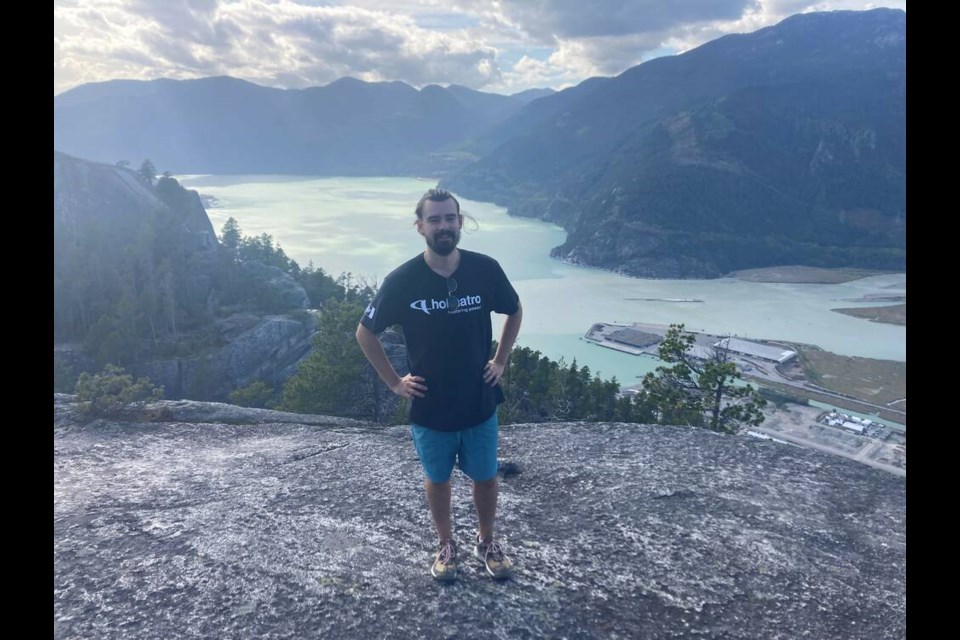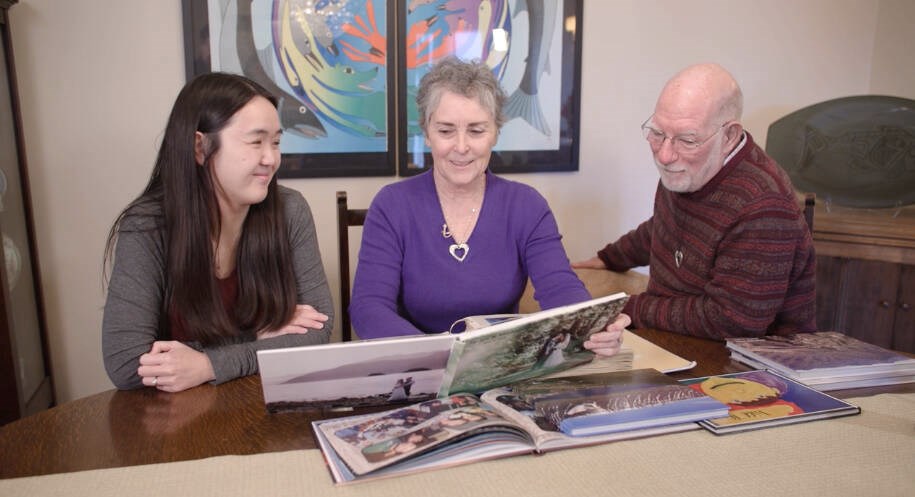In the small community of Lions Bay, two families in the past year have had their lives profoundly touched by organ transplant.
For Ross and Mary Brown, organs donated by their son Michael Brown following a tragic surfing accident have helped bring some comfort following their son’s death.
Just up the street from them, 27-year-old Ryan Burke received a second chance at life after receiving a double-lung transplant.
Burke said he was working as a carpenter in the spring of 2021 when he began to experience shortness of breath. He didn’t think a lot of it at first. Physical work was part of what was required on the job site. But when the problem got worse, Burke found himself bouncing between different specialists and diagnostic tests.
He was grocery shopping on the North Shore when he got a call about the results of an echo cardiogram he’d just had done at Lions Gate Hospital that had identified concerning high pressure in one of chamber of his heart. He was told to turn around and go back to the ER.
From there, more precise testing hurriedly followed.
He was told that constriction and swelling in his pulmonary artery was putting pressure on his heart, that would eventually result in heart failure.
Officially, the diagnosis was late-stage idiopathic pulmonary arterial hypertension.
“It’s an incurable and progressive disease,” he said.
Growing up in Lions Bay, Burke had always been active person. “I did a lot of skiing,” he said, as well as hiking and pick-up sports with friends.
But as his health declined, “I couldn’t walk out my front door,” he said, noting that the direction in Lions Bay tends to be uphill. “I would drive to flat places to walk.”
Burke’s medical team tried various drugs but “they were all relatively ineffective,” he said.
Doctors didn’t sugar coat his prognosis, telling him unless he had a transplant, he probably had about two years left to live.
“I was pretty confident that my time was quite limited,” he said.
A second chance at life
But that all changed one Sunday in April 2023 when Burke, then 26, got a call telling him a set of lungs was available.
On the drive down to the hospital in Vancouver, Burke said he felt a range of emotions – including gratitude mixed with apprehension.
“All the emotions kind of balance each other out,” he said. “I knew that’s what I needed to go through.”
Burke was in an induced coma for three days after the transplant and spent a further month in hospital, adjusting to his new lungs. He remembers the first time he could walk around the hospital floor and not be out of breath.
The day he got out of hospital in May, the air was warm and fresh, he remembers.
Months of rehab exercises followed.
Slowly, he began walking the local trails, uphill into the forest. He hiked to St. Mark’s Summit and has been out paddleboarding and skiing again.
In keeping with BC Transplant policies, Burke doesn’t know who his organ donor was. (Donor families and recipients may write to each other anonymously but contact only happens if both parties independently request it and over a year has passed.)
But he’s had a glimpse into their world through the family of Michael Brown, whose parents live just a short distance away in Lions Bay.
Donor family takes comfort amid tragedy
Growing up, Burke knew Michael’s father Ross Brown was “a very respected and accomplished surgeon,” he said.
Burke said it was devastating to hear about the tragedy that struck the family in August of last year, just a few months after his own transplant.
A surfing accident off the coast of Tofino left Michael, 36, with a non-recoverable brain injury, from which he later died.
For Brown’s family, however, Michael’s decision to sign up as an organ donor and give hope to other families has provided comfort.
“He gave us the ability to look forward,” said Ross Brown.
As a trauma surgeon, Brown said he had lots of experience with medical crises.
That had led to early conversations as a family about organ donation.
“Our kids knew we [had signed up] as organ donors,” said Brown. “It gives the opportunity to have a discussion around that.”
Jaclyn Ko, Michael’s wife, said knowing how her husband felt about organ donation was “very helpful for me” and the rest of Michael’s family when faced with the news that the medical team could not save his life.
“He felt strongly that if he didn’t need those organs and tissues someone else could benefit,” she said.
That was just part of his character, she said. Michael had always been the sort of person willing to lend a hand to those less fortunate and champion the underdog.
During his life, Michael had used his training as an emergency medical technician to carry around a large first aid kit, which he’d often use to help out whoever needed it, said his wife, including administering Naloxone. He saved at least seven people from overdosing with those kits.
According to BC Transplant, Michael Brown ended up saving or transforming 10 lives by donating his organs.
“It gives us a sense of something positive happening out of our tragedy,” said Ko.
Last year saw a record number of 562 organ transplants performed in British Columbia, according to BC Transplant.
As of Dec. 31, 2023, there were 512 British Columbians still waiting for organ transplants.
Anyone who wants to register as an organ donors can do so at www.taketwominutes.ca.




